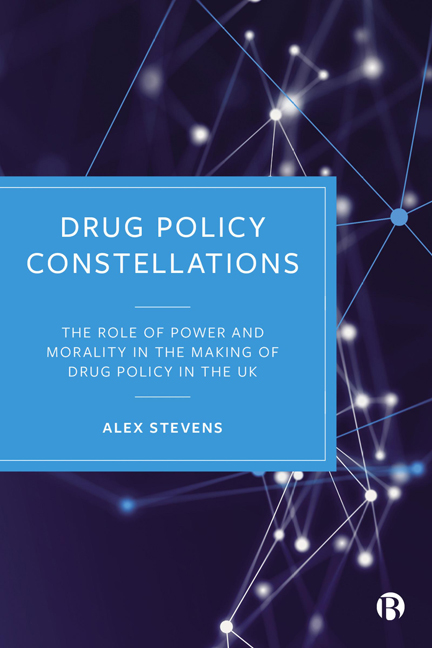Book contents
- Frontmatter
- Dedication
- Contents
- List of Figures and Tables
- About the Author
- Preface
- 1 An Introduction to Drug Policy Constellations
- PART I Contexts, Concepts and Methods for Studying Drug Policy Constellations
- PART II Morality and Power in UK Drug Policy Constellations
- PART III Cases in Drug Policy Making in the UK
- Notes
- References
- Index
2 - Facts and Narratives of the UK Drug Policy Context
- Frontmatter
- Dedication
- Contents
- List of Figures and Tables
- About the Author
- Preface
- 1 An Introduction to Drug Policy Constellations
- PART I Contexts, Concepts and Methods for Studying Drug Policy Constellations
- PART II Morality and Power in UK Drug Policy Constellations
- PART III Cases in Drug Policy Making in the UK
- Notes
- References
- Index
Summary
Our choices of how to measure and describe the illicit drug phenomenon are themselves moral and political. These forces shape the narratives on which we draw when making policy, which are known as ‘policy narratives’ (Roe, 1994; Hajer, 1995; Rhodes, 2018). Narratives string together ideas that frame the problem in a particular way and so suggest a certain response (Jones and McBeth, 2010; Wolton and Crow, 2022). They often include recurring tropes, the elements that are used to construct the story, like the big bad wolf, the dark forest, the innocent child, the heroic woodcutter and the evil baron. They represent the problem (Bacchi, 2009), but they also relate to actual events and real causal processes (Flatschart, 2016; Stevens, 2020a).
Some narratives and their tropes have been a consistent feature of drug policy discussions for decades. An example is the idea that opioid maintenance prescribing for people who are dependent on heroin is just like prescribing insulin to people with diabetes. I found this trope in a book published in the 1960s (Laurie, 1967) as well as in recent discussions. Other long-standing examples include the ideas that there is a ‘war on drugs’ or that cannabis is a ‘gateway drug’.
We need to place these narratives in their broader contexts. In my interview with him, Professor Keith Humphreys reminded me of the importance of previous decisions and other policy fields in influencing current drug policy. What he called “decision accretion” – the set of decisions that have built up over time – influence what any policy actor can do now. Humphreys linked this to another point about drug policy, which is that it hardly exists in its own right. In a saying that he attributed to our mutual friend Peter Reuter, he said “drug policy is a sort of analytical convenience that doesn't actually exist. You know, a lot of it is about other things”. Another academic, David Best, told me something similar about the dependence of drug policy on other fields, like health and economic policy: “You could have whatever drug policy you like. If those other areas aren't moving in a similar direction, it's irrelevant really.”
- Type
- Chapter
- Information
- Drug Policy ConstellationsThe Role of Power and Morality in the Making of Drug Policy in the UK, pp. 11 - 19Publisher: Bristol University PressPrint publication year: 2024

